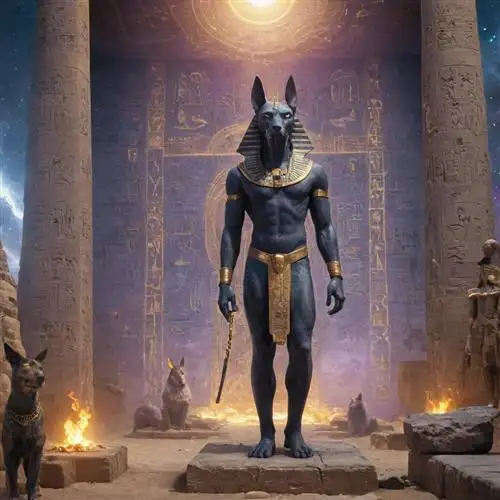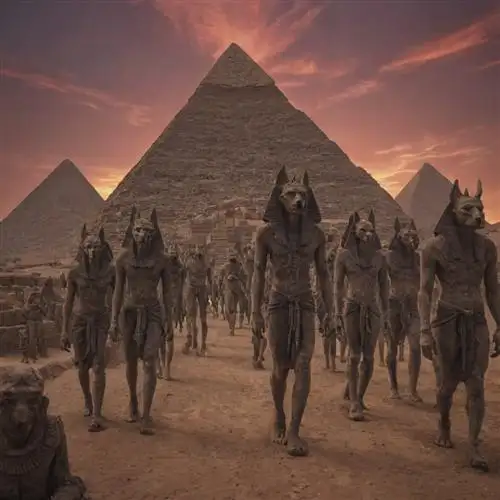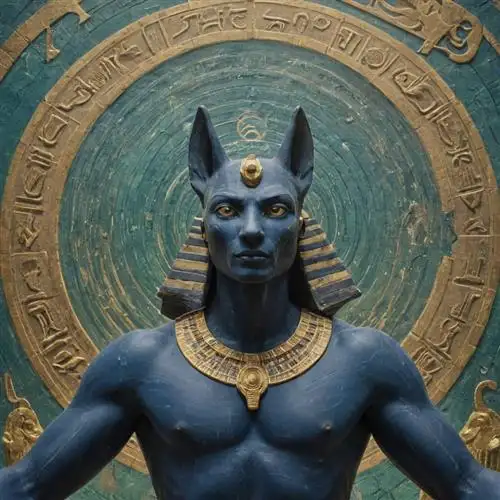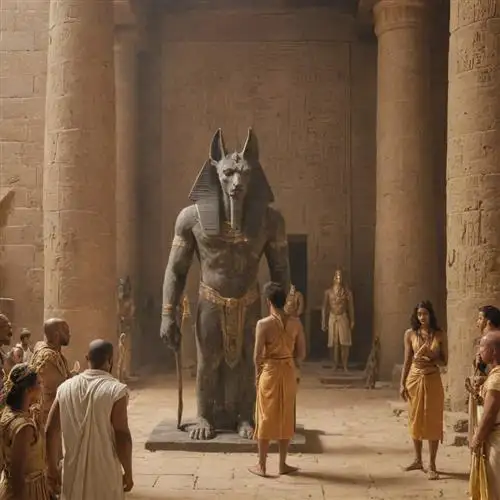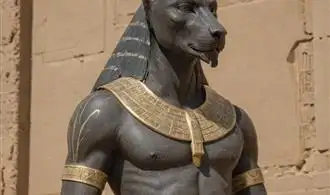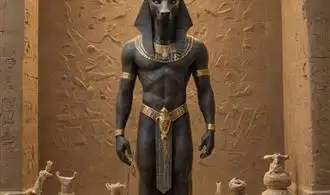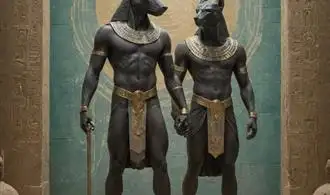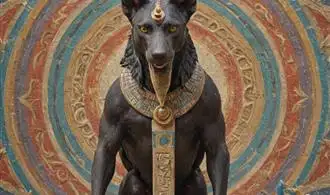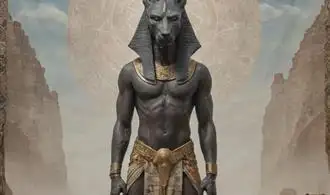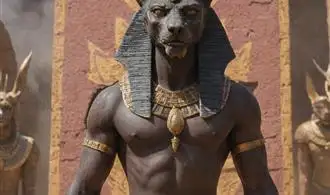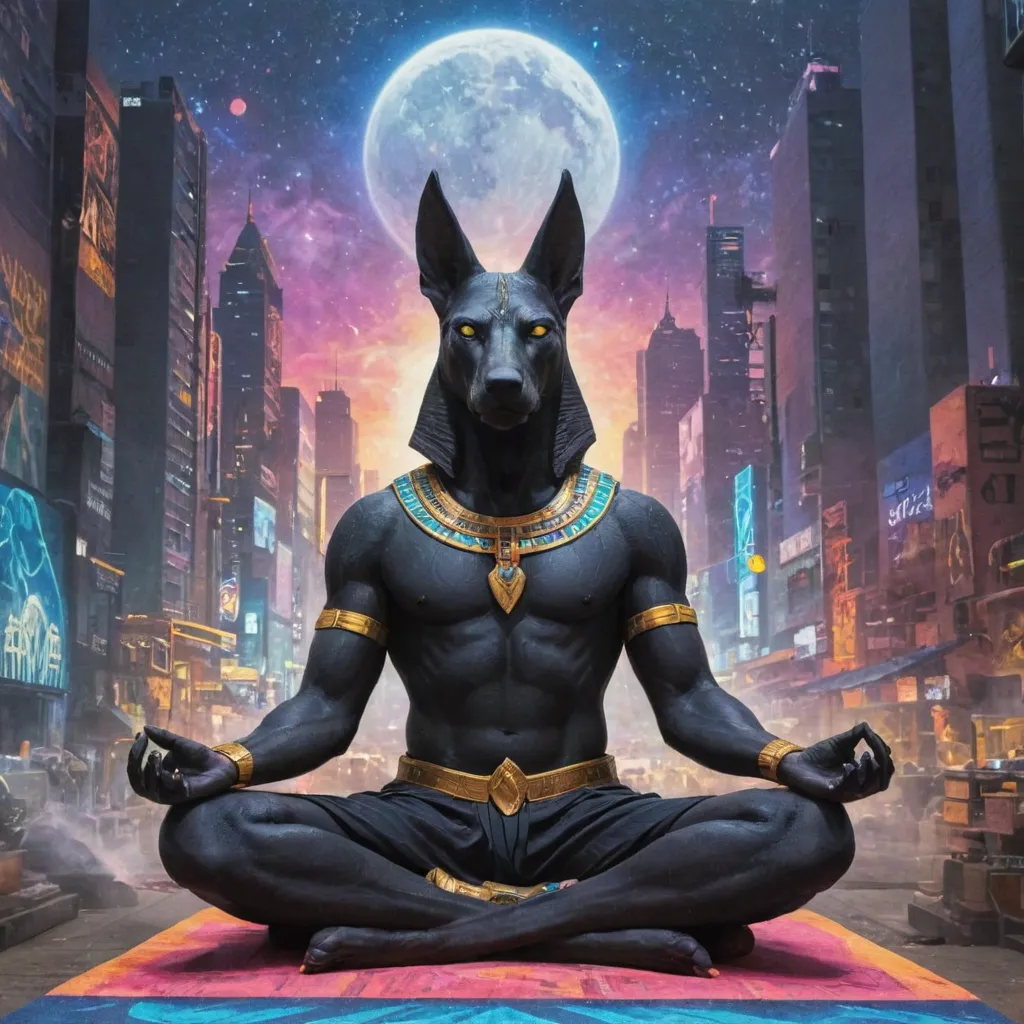
The Symbolism and Significance of Anubis
Anubis, the ancient Egyptian jackal-headed deity, holds a powerful and multifaceted symbolism that has captivated scholars and spiritual seekers alike. As the god of embalming and the underworld, Anubis played a crucial role in the Egyptian conception of the afterlife and the journey of the soul.
At the heart of Anubis' significance lies his role as the guardian of the dead and the overseer of the mummification process. He was believed to be responsible for the preservation of the physical body, ensuring a smooth transition for the deceased into the afterlife. This connection to the funerary rites and the protection of the dead imbued Anubis with a profound sense of reverence and importance within the ancient Egyptian worldview.
Beyond his role in the afterlife, Anubis also symbolized the importance of transition and transformation. As a jackal-headed deity, he was associated with the liminal spaces between life and death, the conscious and the unconscious, and the physical and the spiritual realms. This symbolic association with the threshold and the process of change made Anubis a powerful figure in the ancient Egyptian pantheon, representing the cyclical nature of existence and the potential for spiritual growth.
The black color of Anubis' skin is another significant aspect of his symbolism. The color black was revered in ancient Egypt, representing the fertile soil of the Nile River and the fecundity of the land. In the context of Anubis, the black color was also linked to the decomposition and regeneration of the body, emphasizing the cyclical nature of life and death.
Furthermore, Anubis was believed to be the patron of embalming and the protector of the deceased during the mummification process. This role gave him a vital importance in the Egyptian conception of the afterlife, as he ensured the preservation and safe passage of the soul into the next realm.
Anubis Guardians of the Dead
In the ancient Egyptian pantheon, Anubis stands as a profound and revered figure, embodying the sacred role of guardian of the dead. This jackal-headed deity was believed to oversee the critical process of mummification, ensuring the proper preparation and transition of the deceased into the afterlife. Anubis' connection to the realm of the dead was multifaceted, encompassing not only the physical transformation of the body but also the spiritual journey of the soul.
Central to Anubis' responsibilities was the ritual of the "weighing of the heart," a pivotal moment in the Egyptian conception of the afterlife. During this ceremony, the deceased's heart was weighed against the feather of Ma'at, the goddess of truth and justice. Anubis, as the conductor of this solemn rite, would carefully observe the proceedings, ensuring the balance between the heart and the feather was maintained. This symbolic act was believed to determine the fate of the soul, with a heart that outweighed the feather resulting in the individual's eternal damnation.
Beyond the weighing of the heart, Anubis also played a crucial role in guiding the deceased through the treacherous underworld. As the guardian of cemeteries and necropolis, Anubis was believed to escort the dead to the realm of Osiris, the lord of the afterlife. This journey was fraught with peril, as the deceased had to navigate a labyrinth of challenges and obstacles to reach their final resting place. Anubis, with his keen senses and deep understanding of the underworld, was considered the ideal protector and guide for the souls of the departed.
The significance of Anubis in the Egyptian conception of the afterlife cannot be overstated. As the intermediary between the world of the living and the realm of the dead, Anubis was revered for his ability to facilitate the transition and ensure the safe passage of the deceased. This revered status was reflected in the numerous funerary rites and rituals dedicated to Anubis, as the Egyptians sought to honor and appease this powerful deity in their quest for a harmonious and fulfilling afterlife.
Unlocking the Wisdom of Anubis for Personal Transformation
Anubis, the ancient Egyptian god of the dead, holds a profound and transformative wisdom that can guide us on our journey towards personal enlightenment. As the god who presided over the embalming process and the afterlife, Anubis offers us a unique perspective on the cycle of life, death, and rebirth, and the valuable lessons we can glean from these profound experiences.
At the core of Anubis' teachings is the concept of introspection and self-reflection. The jackal-headed deity encourages us to confront our own mortality, to examine the dark corners of our psyche, and to embrace the transformative power of change. By engaging with the wisdom of Anubis, we can unlock a deeper understanding of our own inner landscapes, and cultivate the courage to face our fears and insecurities head-on.
One of the key ways to tap into the wisdom of Anubis is through the practice of meditation and contemplation. By quieting the mind and focusing our attention inward, we can access the intuitive and symbolic language of the subconscious, where the insights of Anubis reside. Through this deep inner work, we can uncover the hidden connections between our external experiences and our internal processes, and gain a newfound clarity and purpose in our lives.
Another powerful aspect of Anubis' wisdom is the concept of transformation and rebirth. As the god who presides over the process of mummification and the afterlife, Anubis reminds us that death is not the end, but rather a necessary step in the cycle of renewal and regeneration. By embracing this understanding, we can learn to let go of the things that no longer serve us, and open ourselves up to the possibilities of personal growth and transformation.
Rituals and Practices Honoring Anubis
Anubis, the jackal-headed deity, holds a revered place in ancient Egyptian mythology and spirituality. As the god of the dead, the afterlife, and embalming, Anubis was integral to the funeral rites and the journey of the soul. Honoring this powerful deity through specific rituals and practices can deepen one's connection to the ancient wisdom and facilitate personal transformation.
One of the essential rituals in honoring Anubis is the purification ceremony. This involves the use of sacred oils, incense, and water to cleanse the body, mind, and spirit, preparing the individual for deeper communion with the divine. Many practitioners may also incorporate the chanting of ancient hymns or the recitation of specific prayers to invoke the presence and protection of Anubis.
Another important practice is the offering ritual. Egyptians would present Anubis with various gifts, such as food, flowers, or symbolic objects, as a way to show reverence and gain the deity's favor. These offerings were often placed at the entrance of temples or shrines dedicated to Anubis, or during specific festivals and ceremonies.
Meditation and visualization techniques are also commonly used to connect with Anubis. Practitioners may envision the jackal-headed god, focusing on his powerful presence and the wisdom he imparts. This can be a deeply transformative experience, allowing individuals to tap into the profound mysteries of the afterlife and the transition between the physical and spiritual realms.
Ritual journeying, where the practitioner enters a meditative state to explore the realms of the dead, is another powerful practice associated with Anubis. During these journeys, individuals may seek guidance, wisdom, or even direct communication with the deity, gaining insights into the nature of the afterlife and the transformation of the soul.
Additionally, the symbolism of Anubis is often incorporated into personal or communal rituals, such as the creation of amulets, talismans, or other sacred objects. These items may be imbued with the energy and protection of Anubis, serving as a tangible connection to the ancient wisdom and the realm of the dead.
By engaging in these rituals and practices, individuals can deepen their understanding of Anubis and the profound teachings he offers. Through this process of honoring the ancient Egyptian god, one can not only gain insight into the mysteries of the afterlife but also cultivate a sense of personal transformation and spiritual enlightenment.
Anubis Influence on Modern Spirituality
Anubis, the ancient Egyptian deity associated with mummification and the afterlife, has had a profound and enduring influence on modern spirituality. As a figure of great significance in the pantheon of Egyptian gods, Anubis' symbolism and teachings have been embraced by a wide range of spiritual and esoteric traditions, offering insights into the mysteries of the human experience.
One of the primary ways Anubis has impacted modern spirituality is through the concept of death and the transition to the afterlife. Anubis was responsible for guiding the deceased through the process of mummification and ensuring a successful journey to the afterlife. This role has been interpreted by many modern spiritual practitioners as a metaphor for the transformation and rebirth that occurs during the process of spiritual awakening and enlightenment. The image of Anubis, with his jackal-like head, has become a powerful symbol of the duality between life and death, and the necessity of embracing both in order to achieve a deeper understanding of the human experience.
Additionally, Anubis' association with the process of judgement and the weighing of the heart against the feather of truth has resonated with modern spiritual seekers. This ritual, depicted in ancient Egyptian funerary texts, is seen as a powerful metaphor for the importance of self-examination, moral integrity, and the need to balance one's actions and thoughts with a higher sense of purpose and ethical conduct. Many contemporary spiritual practices, such as meditation, contemplation, and shadow work, can be viewed as modern interpretations of this ancient Egyptian ritual, where individuals strive to confront their own inner demons and align their lives with a greater universal truth.
Furthermore, Anubis' role as a psychopomp, or a guide of souls, has been embraced by various modern spiritual traditions. The idea of Anubis assisting the deceased in their transition to the afterlife has been adapted by practitioners of shamanism, astral projection, and other spiritual practices that explore the realms of consciousness and the non-physical aspects of the human experience. Anubis is often invoked as a protector and guide, helping individuals navigate the complex and often challenging journey of self-discovery and spiritual growth.
The influence of Anubis on modern spirituality is not limited to the realm of death and the afterlife. The god's association with embalming, preservation, and the transformation of the physical body has also resonated with practitioners of holistic healing, herbalism, and alternative medicine. Anubis is sometimes seen as a patron of these practices, offering guidance and wisdom in the process of physical and spiritual restoration and renewal.

